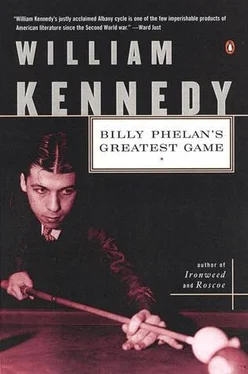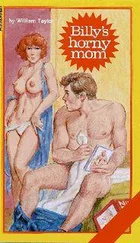William Kennedy - Billy Phelan's Greatest Game
Здесь есть возможность читать онлайн «William Kennedy - Billy Phelan's Greatest Game» весь текст электронной книги совершенно бесплатно (целиком полную версию без сокращений). В некоторых случаях можно слушать аудио, скачать через торрент в формате fb2 и присутствует краткое содержание. Год выпуска: 1983, Издательство: Penguin Books, Жанр: Современная проза, на английском языке. Описание произведения, (предисловие) а так же отзывы посетителей доступны на портале библиотеки ЛибКат.
- Название:Billy Phelan's Greatest Game
- Автор:
- Издательство:Penguin Books
- Жанр:
- Год:1983
- ISBN:нет данных
- Рейтинг книги:5 / 5. Голосов: 1
-
Избранное:Добавить в избранное
- Отзывы:
-
Ваша оценка:
- 100
- 1
- 2
- 3
- 4
- 5
Billy Phelan's Greatest Game: краткое содержание, описание и аннотация
Предлагаем к чтению аннотацию, описание, краткое содержание или предисловие (зависит от того, что написал сам автор книги «Billy Phelan's Greatest Game»). Если вы не нашли необходимую информацию о книге — напишите в комментариях, мы постараемся отыскать её.
Billy Phelan's Greatest Game — читать онлайн бесплатно полную книгу (весь текст) целиком
Ниже представлен текст книги, разбитый по страницам. Система сохранения места последней прочитанной страницы, позволяет с удобством читать онлайн бесплатно книгу «Billy Phelan's Greatest Game», без необходимости каждый раз заново искать на чём Вы остановились. Поставьте закладку, и сможете в любой момент перейти на страницу, на которой закончили чтение.
Интервал:
Закладка:
“You’ve done it all.”
“I wouldn’t go as far as to say that, lovey.”
“But it must be difficult to surprise you.” Martin resented her use of “lovey.” It sounded vaguely cockney, and insufficiently intimate for what they’d had together.
“Surprises are always welcome,” said Melissa, “but they’re only the interest on the principal, and it’s the principal I’m most fond of.”
“I have a bit of a surprise for you,” Martin said.
“How delicious,” said Melissa. “When do I get it?”
“Don’t be forward now.”
When breakfast came she insisted he sit on the sofa as they had at the Hampton, and she dropped pieces of melon into his mouth, a scene, he presumed, she had copied from a Valentino or Gilbert film. She lifted champagne to his lips, gave him wafer-thin slices of camembert and croissant, and more and more champagne. He thought he had eaten his fill at Keeler’s, but satiation too has its limitations, and he accepted all that she offered.
He kissed her when both their mouths were full, shared his champagne with her. He kissed her again when their mouths were empty, stroking the breast of her robe lightly. And then he leaned away.
“What is this gift you have for me?” he said.
“Can’t you guess?”
“I’ve imagined a thing or two.”
“I hope you didn’t see it,” she said, rising from the sofa and crossing the room. She held up the ledger, giving him a full view of the cover with another of his father’s date markings: February 1908 to April 1909.
“I didn’t mean to leave it here in full view, but you caught me unawares, coming in like that. You didn’t see it before, did you?”
“No, no, I didn’t. You say you’re returning it?”
“It’s yours,” she said, coming toward him with it. “I took all I needed for my memoirs.”
“I thought you wanted it for the film.”
“It’s not necessary now. They have more than enough in the play, if they really want to do it. They don’t deserve any more than that. So it’s yours.”
“Then I must return your money.”
“Of course you must not. Absolutely you must not.”
He had charged her eight hundred dollars for the ledger, an arbitrary price from nowhere, for how could he possibly have set a true dollar value on one of his father’s notebooks? He’d said eight hundred for reasons no more explicable than his dream of rhomboids. An odd figure, she said. Oddness, he told her, is my profession.
They had been talking then on the roof garden of the Hampton, where she had taken a suite while she found a way to take possession of the ledger, whose contents she had, at moments, watched being written. The Albany sky was the darkest of blues, swept by millions of stars, the moon silvering the river and the rooftops of buildings on the Rensselaer side. From where Martin and Melissa sat, the Yacht Club, the night boat landing, the Dunn bridge, and much of lower Broadway were blocked from view by a tall, ghostly structure with window openings but no windows, with an unfinished, jagged, and roofless top. This was the “Spite Building,” built by a bitter cleric who felt the Hampton had wronged him. And when the hotel opened its roof garden to enormous crowds, the cleric erected this uninhabitable tower of vengeance. It fronted on Beaver Street and nestled back to back with the hotel, and it rose, finally, above the glamorous rooftop cafe, blocking the view and insulting the lofty crowds with its crude bricks and its grotesque eyeless sockets, where squads of verminous pigeons roosted.
Martin and Melissa dined and danced and drank together, abandoning the Hampton roof eventually for the privacy of Melissa’s suite. And when the morning came, Martin walked the few blocks to the newspaper, took the ledger from the bottom drawer of his desk, where he’d put it the day before, and brought it back to Melissa. In return he accepted the mysterious eight hundred, and also accepted two and a half more days of lascivious riches from this calculating, venal, and voluptuous incarnation of his psychic downfall.
Melissa now placed the ledger on his lap and sat beside him. He opened it to a page from 1908 and read the words written in his father’s upright script, which looked like a wheat field on a windless day.
The hero will not be a writer. Profession left vague? No. He will be Irish-American foundry owner who came up hard way in commerce, through opportunity and hard work, well educated, from family whose social pretensions were wiped out by influx of ’49. Marries daughter of aristocratic Dutch-English family (any near-autobiographical data must be transformed) and secret life of failed marriage is revealed. Wife’s aspirations for money and position, not for themselves but out of halcyon yearning, become clear; and these are ineradicable and dementing. Sexually dutiful but her wound in Delavan Hotel fire eradicates even that; early traumas only suggested, yet evident. Eventually she retreats, marriage begins to wither.
Martin turned the pages well forward, stopped, smiled, and read out loud: “ ‘Clarissa. Valley of veneration. Cave of nuances. Isosceles jungle. Lair of the snake. Grave of the stalker.’ ” He paused to look at her.
“I know that page by heart,” she said.
“ ‘Grave of the stalker,’ ” Martin said. “He could be a silly man. I see an erected Hawkshaw. Tell me. Did you ever go round the clock with him for three days as you did with me?”
“That’s a very impertinent question. Do you really think I’d tell you?”
“I thought one day you might compare notes on us. I fantasized your reply.”
“And naturally you win that contest.”
“I didn’t think of it as a contest. More a contrast of styles.”
“Let me say, and end it here, that exuberance runs in your family.”
“Up exuberance,” he said, and drank his champagne.
She refilled his glass and raised hers.
“And here,” she said, “a toast to my gifts.”
“And rare and splendid they are. Up your gifts.”
“I was speaking of my gifts to you.”
“Gifts, you say. Is there more than one?” And he touched the ledger.
“One more.”
“Which one is that?”
“The one and only,” she said, and stood up before him and opened her robe to reveal no negligee, only that indelibly remembered torso, with its somewhat graying isosceles jungle trimmed and shaved with supreme care in the contour of a heart.
“It’s a bit late in the year,” she said, “but will you be my valentine?”
Martin opened his belt, the front burtons of his trousers, the three burtons of the shorts he’d put on clean this morning, and presented to her the second-generation stalker, full grown now, oh yes, wrapped in white tissue paper, tied with green ribbon, and tagged with a small card bearing the greeting: Happy Anniversary.
As he made love to Melissa he studied that portion of her neck and breast where his mother had been scarred by the point of a flaming, flying stick in the fire that killed fifteen people, most of them Irish servant girls. Melissa bore no such marks. Her mark was her face, and he kissed it lavishly, loathing both himself and her, loving her with passionate confusion, pitying her the gift of such a face, for it had been her torment. What man could ever think he alone possessed a beauty so famed, so excessive? Who could own Botticelli’s Primavera?
His mother’s scar had been a white oval with a scalloped circumference where the stitching had drawn her wound together. He closed his eyes as he kissed Melissa, and behind him the white scar grew by itself, a floating ovoid that became witness to his act. The scar swelled, and Martin thought of the flaming ball of tow that had marked the elder Henry James, playing in Albany Academy park, the park on which Katrina’s Elk Street home fronted. The young James, then only thirteen, had been flying hot-air balloons, which rose skyward when the flaming tow balls were placed beneath them. One James balloon ascended from the park and when the flaming tow ball fell to earth, someone kicked it and arced it into the hayloft of a livery stable across Washington Avenue. The conscientious James ran to the stable to put out the fire, but his pants leg had been splashed by turpentine from soaking the tow, and it ignited like the tail of a comet. The burns led to amputation, creating a mystic philosopher from an incipient outdoorsman, and changing the future of American culture. Serendipitous movement from Edward to Melissa to Henry to Martin. Bright flaming people in a roundelay of accidental life that alters the world.
Читать дальшеИнтервал:
Закладка:
Похожие книги на «Billy Phelan's Greatest Game»
Представляем Вашему вниманию похожие книги на «Billy Phelan's Greatest Game» списком для выбора. Мы отобрали схожую по названию и смыслу литературу в надежде предоставить читателям больше вариантов отыскать новые, интересные, ещё непрочитанные произведения.
Обсуждение, отзывы о книге «Billy Phelan's Greatest Game» и просто собственные мнения читателей. Оставьте ваши комментарии, напишите, что Вы думаете о произведении, его смысле или главных героях. Укажите что конкретно понравилось, а что нет, и почему Вы так считаете.












